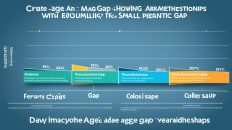Have you ever found yourself attracted to someone who was significantly older or younger than you? Maybe you’ve even ventured into an age gap relationship, drawn in by the excitement and novelty of a May-December romance. But if you’ve experienced the challenges that often come with these relationships, you may be left wondering why they don’t always work out.
Age gap relationships, where partners have a significant difference in age, can be fraught with difficulties. From generational differences to societal expectations, there are numerous obstacles that can strain the connection between two people. As someone who has personally navigated the complexities of an age gap relationship, I understand the ups and downs that come with it.
I was in a relationship with someone who was nearly a decade older than me, and while we shared many wonderful moments, we also encountered our fair share of challenges. The differences in our life stages and goals became apparent as time went on, and it became clear that our expectations for the future didn’t align. We also faced disapproval from friends and family who raised concerns about the potential pitfalls of dating someone significantly older.
Through my own experience and research, I’ve come to understand the negative effects that age gaps can have on relationships. These include issues with power dynamics, divergent life goals, and the difficulty of bridging generational gaps. But it’s not all doom and gloom. By understanding the reasons why age gap relationships often fail, we can better navigate the challenges and create more fulfilling connections.
In this article, we will delve into the truth behind why age gap relationships don’t always work, exploring the various challenges and pitfalls they face. We’ll also discuss the factors that influence relationship satisfaction and provide insights into making age gap relationships thrive. Whether you’re currently in an age gap relationship or considering one, this article will provide valuable information to help you navigate the complexities and make informed decisions.
Key Takeaways:
- Age gap relationships can be challenging due to generational differences and societal expectations.
- Pitfalls such as power imbalances, divergent life goals, and disapproval from loved ones can strain age gap relationships.
- Understanding the factors that influence relationship satisfaction can help navigate the challenges and create a fulfilling connection.
- Successful age gap relationships require open communication, shared values, and a willingness to compromise.
- While age difference is a factor, other aspects such as financial security and emotional compatibility play vital roles in relationship success.
Why People Prefer Partners in the Same Age Range
When it comes to romantic relationships, people tend to gravitate towards partners who are in the same age range as them. This preference is influenced by various factors, including mate value, stability in relationships, attractiveness, and the age factor.
Mate value is an important consideration in partner selection. It encompasses a range of qualities and attributes that individuals find desirable in a potential mate. Age plays a significant role in determining mate value, as it affects physical attractiveness, knowledge, experience, and financial stability.
Physical attractiveness is often associated with youth, and younger individuals are considered more physically attractive. This perception is influenced by societal standards and personal preferences. Additionally, younger individuals may be perceived as having higher fertility, which is valued in mate selection.
Furthermore, knowledge and experience gained with age contribute to mate value. Older individuals may possess wisdom, life experience, and a broader perspective, which can be attractive qualities in a partner. Financial stability is also closely linked to mate value and is often associated with older individuals who have had more time to establish themselves in their careers.
Stability in relationships is another important factor that drives people to prefer partners in the same age range. Similar life experiences, goals, and values can contribute to a more stable and harmonious partnership. Individuals who are at similar life stages are likely to face comparable challenges and have compatible future aspirations, which can foster a stronger bond.
“Age-gap relationships often face challenges and are perceived as more challenging and harder to sustain.”
Although age-gap relationships exist and can be successful, they are generally less common. The perceived challenges and potential difficulties associated with age gap partnerships deter many people from pursuing such relationships.
Looking at these factors, it’s understandable why people tend to prefer partners in the same age range. The alignment of mate value, stability in relationships, attractiveness, and shared experiences can contribute to a more fulfilling and successful partnership.
| Benefits of Partners in the Same Age Range | Challenges of Partners in Different Age Ranges |
|---|---|
|
|
The Impact of Age on Mate Value
Age plays a significant role in determining mate value in relationships. In heterosexual relationships, there is often a preference for partners of a certain age due to their perceived qualities and attributes.
Men tend to be attracted to younger women due to biological and social factors. Younger women are seen as more fertile and physically attractive, which aligns with men’s reproductive instincts. This preference can be attributed to the belief that younger women have a greater ability to bear children and pass on their genes.
“Men are drawn to younger women due to their perception of higher fertility and physical attractiveness.”
On the other hand, women generally prefer older partners, particularly older men. This preference is influenced by the perception that older men possess greater knowledge, experience, and financial stability. Women often seek partners who can provide security and stability, both emotionally and financially.
“Women are attracted to older men because they value their knowledge, experience, and financial stability.”
This preference for older men can also be attributed to the decline in female fertility with age. Women may seek out partners who are more likely to help them in their quest for family planning and building a future together.
In summary, age plays a crucial role in determining mate value. Men are drawn to younger women due to their perceived fertility and physical attractiveness, while women prefer older partners who possess knowledge, experience, and financial stability. This preference is influenced by both biological and social factors.
Age Preference in Heterosexual Relationships
| Partners | Age Preference |
|---|---|
| Men | Younger women |
| Women | Older men |
The Stigma Surrounding Age Gap Relationships
Age gap relationships often face social disapproval and stigma within society. Due to the significant age difference, these relationships are often perceived as unequal, with one partner potentially taking advantage of the other. This unequal power dynamic can lead to assumptions of exploitation and raise concerns about the well-being of the individuals involved.
One specific group that often experiences social disapproval in age gap relationships is older women in relationships with younger men. Society’s expectation of women’s fertility and their perceived decline with age can result in assumptions that these relationships are solely driven by the older woman’s desire to exploit the younger man.
Furthermore, family and friends may voice their concerns about age gap relationships due to societal expectations and worries about the future. They may question the stability and longevity of these relationships, leading to added pressure and emotional strain on the couple.
However, it’s important to remember that every relationship is unique, and societal expectations should not dictate individual happiness and fulfillment. Age gap relationships can be based on genuine love, shared values, and mutual respect, regardless of the age difference.
“Love knows no age boundaries. What matters most is the connection and understanding between partners, regardless of societal expectations.”
Societal Expectations and Exploitation
Societal expectations regarding age gap relationships create a stigma that may overshadow the authentic connection between partners. This stigma can lead to judgment and prejudice, causing emotional distress for the couple involved. It’s essential to challenge these stereotypes and recognize that love and compatibility can transcend age.
Exploitation concerns often arise in relationships with significant age gaps, particularly when one partner has greater financial or life experience than the other. However, it’s crucial to remember that exploitation can exist in relationships of any age, and it should not be automatically assumed in age gap partnerships. Open and clear communication, common goals, and respect for each other’s autonomy can help address these concerns and foster healthy relationships.
Overcoming Social Disapproval
While age gap relationships may face societal disapproval, it’s essential for individuals to prioritize their own happiness and fulfillment. By focusing on their love and understanding of each other, couples in age gap relationships can rise above social judgment and create a supportive and loving environment.
“Don’t let societal expectations discourage you. Love knows no age, and age gap relationships can flourish when built on trust, communication, and shared values.”

Challenges in Age Gap Relationships
Age gap relationships can encounter various challenges that arise from differences in life stages, power dynamics, timelines for having children, and financial differences.
When partners in an age gap relationship are at different life stages, it can create disparities in goals, expectations, and priorities. One partner may be focused on career advancement while the other is ready to settle down and start a family. These differences can lead to misunderstandings and conflicts if not addressed through open and honest communication.
“Differences in life stages require open communication and understanding to bridge the gap.”
Power dynamics can also be a factor in age gap relationships, particularly when one partner is significantly older and more established professionally and financially. The older partner may have more influence and decision-making power, which can potentially lead to imbalance and strain in the relationship. It is important for both partners to maintain mutual respect, open dialogue, and equal decision-making to ensure a healthy and fulfilling partnership.
“Balancing power dynamics is essential for maintaining a harmonious and equal age gap relationship.”
Another challenge faced by age gap couples is the issue of having children. Fertility concerns may arise when one partner is significantly older, and the couple may need to carefully consider timelines and potential medical interventions. Discussions about starting a family should be approached with sensitivity, understanding, and a willingness to explore all available options.
“Having open conversations about family planning can help address the complexities of having children in an age gap relationship.”
Financial differences can also present challenges in age gap relationships. The older partner may have accumulated more wealth and financial stability, which can create disparities in lifestyle, spending habits, and decision-making. It is crucial for both partners to openly discuss financial expectations, establish shared financial goals, and find a balance that works for both individuals.
| Challenges in Age Gap Relationships |
|---|
| Differences in life stages |
| Power dynamics |
| Timelines for having children |
| Financial differences |
“Addressing challenges in age gap relationships requires open communication, mutual understanding, and a willingness to find common ground.”
Factors Influencing Relationship Satisfaction
In age gap relationships, several factors influence relationship satisfaction. These factors include shared values, compatibility, communication, financial security, and emotional intelligence.
Shared Values
Partners with shared values are more likely to experience satisfaction in their relationship. When individuals align in their beliefs, interests, and goals, they can build a strong foundation of mutual understanding and support. Shared values create a sense of unity and help establish a common purpose in the relationship.
Compatibility
Compatibility plays a crucial role in relationship satisfaction. Couples who are compatible in terms of personality, interests, and lifestyle tend to enjoy a deeper connection and higher levels of happiness. They understand and appreciate each other’s needs, allowing them to build a fulfilling and harmonious partnership.
Communication
Effective communication is vital in age gap relationships. Open and honest communication fosters understanding, trust, and emotional intimacy. It allows partners to express their needs, discuss concerns, and resolve conflicts, leading to greater relationship satisfaction. Regular and meaningful conversations promote a sense of closeness and connection.
Financial Security
Financial security is an essential factor in relationship satisfaction. Partners who feel financially stable and secure have fewer concerns about their future and can focus on building a solid foundation for their relationship. Financial harmony and mutual support contribute to a sense of stability and well-being in age gap relationships.
Emotional Intelligence
Emotional intelligence, which involves understanding and managing emotions, is crucial in sustaining relationship satisfaction. Partners who possess emotional intelligence are better equipped to navigate conflicts, express empathy, and provide support. They can foster a nurturing and empathetic environment, enhancing overall relationship satisfaction.
| Factors Influencing Relationship Satisfaction | Importance |
|---|---|
| Shared Values | High |
| Compatibility | High |
| Communication | High |
| Financial Security | Moderate |
| Emotional Intelligence | Moderate |
The Ideal Age Gap Range
When it comes to age gap relationships, research suggests that a specific range tends to lead to higher relationship satisfaction and success. Couples with an age gap of 1 to 3 years report greater levels of contentment in their partnerships. One possible reason for this is the shared childhood memories and experiences that couples with smaller age gaps often have. image of a diverse couple having a picnic in a park, enjoying shared moments from their childhood memories
As the age gap widens, however, relationship satisfaction sees a slight decrease. Couples with age gaps of 4 to 6 years may face additional challenges in their dynamic, related to differences in life stages and experiences. While successful relationships can certainly exist within this range, there may be more hurdles to overcome.
On the other end of the spectrum, age gaps of 10 years or more tend to be more prone to challenges and potential failure. The larger the age gap, the greater the likelihood of facing societal scrutiny, differing generational perspectives, and dissimilar life goals. It’s important to note that successful relationships can still thrive in this range, but partners may need to proactively address and navigate the unique complexities that arise.
The Impact of Shared Childhood Memories
“We had such a blast talking about our favorite childhood TV shows and games. It’s amazing how those shared memories bring us closer together.”
Having shared childhood memories can play a significant role in bonding and enhancing relationship satisfaction. Couples who are closer in age are more likely to have grown up during the same cultural and societal milestones, allowing for a deeper understanding and connection.
These shared experiences can act as building blocks for shared values, common interests, and a deeper sense of relatability. Whether it’s reminiscing about favorite childhood TV shows, playground adventures, or music from a specific era, these memories create a sense of nostalgia and a strong foundation for a fulfilling relationship.
Relationship Satisfaction and Successful Age Gaps
Ultimately, the ideal age gap varies from couple to couple, depending on individual preferences, values, and compatibility. While age gaps of 1 to 3 years tend to have higher relationship satisfaction, it’s important to remember that successful age gap relationships can exist outside this range. Factors such as effective communication, shared values, and mutual support play crucial roles in fostering a healthy and fulfilling partnership.
Next, we’ll dive deeper into the downside of large age gaps, exploring the potential challenges and risks that couples may face. Understanding these factors can help individuals make informed decisions about their own relationships and navigate potential obstacles with open communication and understanding.
The Downside of Large Age Gaps
While age gap relationships can have their challenges, research suggests that relationships with large age gaps, particularly those exceeding 10 years, may be more susceptible to dissatisfaction and higher divorce rates. Several factors contribute to these negative outcomes.
Incompatible Values
Differences in values, beliefs, and priorities can create significant challenges in age gap relationships. When partners have incompatible values, it can lead to frequent conflicts and a breakdown in communication.
Different Life Goals
Age gap relationships often involve partners who are at different stages of life. This difference in life goals can create tension and frustration, as one partner may be ready to settle down and start a family while the other is focused on career advancement or personal growth.
Power Dynamics and Control
In relationships with large age gaps, power imbalances can arise. The older partner may have more life experience, financial stability, and social influence, potentially leading to an unequal distribution of power. This power dynamic can strain the relationship and hinder effective decision-making and joint problem-solving.
“Age differences can create power disparities in relationships, which can be problematic when it comes to making important decisions that affect both partners.”
Lack of Shared Experiences
Partners in age gap relationships may have vastly different life experiences due to the generational gap. This lack of shared experiences can make it challenging to build a strong emotional connection and understand each other’s perspectives and cultural references.
Overall, these factors contribute to a higher likelihood of relationship dissatisfaction and potential separation in age gap relationships with significant age disparities.
| Percentage of divorces in age gap relationships | Age Gap |
|---|---|
| 60% | 10+ years |
| 35% | 5-9 years |
| 20% | 1-4 years |
Making Age Gap Relationships Work
Age gap relationships can thrive and be successful by fostering flexibility, compromise, and clear communication. It’s essential for partners to engage in open discussions about their individual needs, expectations, and shared values. By finding common ground and addressing age-related challenges early on, couples can navigate the potential obstacles that arise in relationships with significant age differences.
Flexibility is key in age gap relationships. Both partners should be willing to adapt and make compromises to accommodate each other’s unique perspectives and preferences. This includes being open to different lifestyles, hobbies, and ways of thinking. Embracing flexibility allows the relationship to grow and evolve with both individuals.
Compromise is another crucial aspect of making age gap relationships work. This means finding middle ground and reaching agreements that satisfy both partners. It may involve finding a healthy balance between individual independence and shared activities, or discussing and deciding on important life choices like career paths, family planning, and general lifestyle preferences.
Shared values play a fundamental role in bridging the age gap. While partners may come from different generations and have varied life experiences, finding common values can provide a strong foundation for the relationship. Shared values can include aspects like honesty, trust, loyalty, and commitment. Emphasizing and nurturing these shared values can help sustain a deep connection between partners.
Clear communication is crucial in any relationship, but even more so in age gap relationships. Partners need to openly express their thoughts, feelings, and needs to ensure understanding and avoid misunderstandings. Effective communication involves active listening, empathy, and respect for each other’s perspectives. It is important to create a safe and non-judgmental space where both partners feel comfortable discussing their concerns and desires.
By fostering flexibility, compromise, shared values, and clear communication, age gap relationships have a higher chance of success. Embracing these principles can help couples overcome the unique challenges that arise from significant age differences and create a strong and fulfilling partnership.
| Principles for Making Age Gap Relationships Work |
|---|
| Flexibility |
| Compromise |
| Shared Values |
| Clear Communication |
Age Isn't the Sole Determinant of Relationship Success
While age difference is a significant factor in relationships, it is not the sole determinant of their success. Various other factors contribute to the strength and satisfaction of a partnership.
Additional Factors for Relationship Success
Financial security is crucial for a stable and harmonious relationship. It provides a sense of security and allows couples to focus on building a life together without constant financial stress. Having children can also impact relationship dynamics and satisfaction. Shared goals and a well-established plan for raising a family can strengthen the bond between partners.
Emotional intelligence, the ability to recognize, understand, and manage emotions, is another essential element of relationship success. It enables effective communication, empathy, and a deep connection between partners.
âFinancial security, having children, and emotional intelligence are vital factors in nurturing a successful partnership.â
In age gap relationships, these additional factors become even more important. Open communication, mutual respect, and shared goals allow couples to overcome the challenges that age disparities may bring.
Creating a Solid Foundation
Building a strong relationship requires a solid foundation that goes beyond age. Partners must prioritize open and honest communication, as well as establish shared values and goals. Financial stability, the decision to have children, and emotional compatibility contribute significantly to the success and satisfaction of any relationship, regardless of age difference.
It is essential for both partners to invest time and effort in understanding each other’s needs and perspectives, creating a supportive environment that promotes growth, happiness, and fulfillment. By focusing on these additional factors, age gap relationships can thrive and prove skeptics wrong.
Examples of Successful Age Gap Relationships
While age gap relationships may face challenges, there are shining examples of successful partnerships that defy societal expectations. One such inspiring couple is the renowned actors Catherine Zeta-Jones and Michael Douglas.
Catherine Zeta-Jones and Michael Douglas have not only defied the odds but have also showcased the enduring strength of their love despite a significant age difference. With Catherine being born on September 25, 1969, and Michael on September 25, 1944, the couple has a notable age gap of 25 years.
| Couple | Age Gap | Successful Relationship |
|---|---|---|
| Catherine Zeta-Jones and Michael Douglas | 25 years | Yes |
Through their unwavering commitment, love, and effective communication, Catherine Zeta-Jones and Michael Douglas have proven that age is just a number when it comes to building a successful partnership. Despite the challenges they may have faced, their enduring relationship is a testament to their shared values and genuine connection.
Successful age gap relationships like theirs serve as beacons of hope, inspiring others to embrace love and overcome societal limitations. By prioritizing understanding, respect, and open communication, couples can forge deep and meaningful connections that stand the test of time.

Overcoming Stigma and Social Pressure
Age gap couples often face stigma and social pressure when it comes to their relationships. However, there are strategies that individuals can employ to overcome these challenges and navigate societal expectations.
1. Creating Love Narratives
One way to justify age gap relationships is by creating “love narratives.” By focusing on the strong foundation of their relationship, couples can emphasize the genuine connection and affection they share. Sharing their love story can help others understand and accept their relationship.
2. Passing as Closer in Age
In some cases, age gap couples may choose to pass as closer in age to avoid judgment or criticism. This can involve dressing in a way that conceals the age difference or downplaying the significance of the gap. By presenting themselves as a more age-matched couple, they can reduce societal scrutiny.
3. Using Humor to Deflect Judgments
Humor can be a powerful tool for age gap couples to dismiss negative comments or stereotypes. By using self-deprecating jokes or light-hearted banter, they can deflect judgment and create a more positive and accepting environment.
“We may have a significant age difference, but our love knows no bounds. Our shared laughter and joy are what truly matter in our relationship.”
4. Dismissing Criticism
Age gap couples can choose to dismiss criticism and judgments from others who do not understand their relationship. By focusing on their own happiness and fulfillment, they can prioritize what is important to them rather than seeking validation from others.
Factors Influencing Relationship Satisfaction in Age Gap Relationships
Age gap relationships can bring unique dynamics and challenges that influence relationship satisfaction. Several factors play significant roles in determining the happiness and contentment of partners involved in such relationships. Understanding and addressing these factors is crucial for building a successful and fulfilling partnership.
Power Dynamics
Power dynamics can strongly impact the satisfaction of age gap relationships. When one partner holds more power or control due to factors like age, experience, or financial stability, it can lead to imbalances and strain the relationship. It is essential for partners to maintain open and honest communication, ensure mutual respect, and work together to create an equitable and empowering dynamic.
Financial and Emotional Well-being
Financial and emotional well-being contribute significantly to relationship satisfaction in age gap relationships. Partners with similar financial goals and stability often experience greater contentment and harmony. Similarly, emotional well-being plays a crucial role in fostering a healthy connection. Supporting each other’s emotional needs and creating a safe and supportive environment can strengthen the relationship and promote satisfaction.
Quote: “A strong foundation of financial and emotional well-being paves the way for a satisfying and fulfilling age gap relationship.”
Individual Autonomy
Maintaining individual autonomy is vital for relationship satisfaction. Each partner has their own desires, goals, and personal growth that should be respected and supported. Encouraging individual autonomy fosters a sense of independence, fulfillment, and self-development within the relationship. Partners can find a balance between maintaining their individuality and nurturing their connection, creating a healthy and enjoyable dynamic.
The Role of Communication and Mutual Support
Clear and effective communication is the cornerstone of any successful relationship, including age gap relationships. Partners should openly discuss their needs, desires, and concerns, ensuring that both parties feel heard and understood. Furthermore, mutual support is essential in providing each other with emotional and practical assistance. By fostering open communication and mutual support, age gap couples can build a strong foundation for a satisfying and lasting partnership.
| Factors Influencing Relationship Satisfaction in Age Gap Relationships | Description |
|---|---|
| Power Dynamics | Partners should address and strive for equitable power dynamics, ensuring a balanced and mutually respectful relationship. |
| Financial and Emotional Well-being | Shared financial goals and emotional support contribute to relationship satisfaction and harmony. |
| Individual Autonomy | Respecting and nurturing each partner’s autonomy promotes a sense of independence and fulfillment within the relationship. |
| Communication and Mutual Support | Open and effective communication, along with mutual support, strengthens the bond and fosters a satisfying partnership. |
Understanding the factors that influence relationship satisfaction in age gap relationships is crucial for navigating their unique challenges and fostering a fulfilling connection. By addressing power dynamics, prioritizing financial and emotional well-being, valuing individual autonomy, and fostering open communication and mutual support, couples can build a strong and satisfying partnership.
Risks and Benefits of Age Gap Relationships
Age gap relationships offer both risks and benefits that individuals should consider when navigating this type of partnership. Understanding these factors can help make informed decisions about pursuing and sustaining an age gap relationship.
The Benefits:
- Differential fertility: One advantage of age gap relationships is the potential for differential fertility. A younger partner may offer a higher likelihood of fertility, which can be beneficial for couples desiring children or extending their family.
- Longer lifespan: Additionally, studies suggest that being in a relationship with a partner of a different age can have positive effects on longevity. Research has shown that individuals in age gap relationships may experience enhanced emotional and physical well-being, leading to a longer and healthier life.
- Economic security: Age gap relationships can provide economic security, especially if there is a significant age difference. An older partner may bring financial stability and a higher level of professional experience, contributing to a secure and comfortable lifestyle.
The Risks:
- Societal pressure: Age gap relationships may face disapproval and scrutiny from society due to traditional norms and expectations. The pressure to conform to societal standards can be challenging, requiring individuals to navigate judgment and potential stigma.
- Power imbalances: With an age gap comes the possibility of power imbalances within the relationship. It is essential to maintain open communication and ensure that both partners have equal agency and decision-making power.
Ultimately, the decision to pursue an age gap relationship should be guided by individual fulfillment and happiness. It is crucial to consider the risks and benefits discussed above, along with personal values, compatibility, and communication dynamics when embarking on an age gap relationship journey. By prioritizing understanding, respect, and shared goals, age gap relationships can flourish and bring meaningful connections.

The Complexity of Age Gap Relationships
The success of age gap relationships is highly dependent on individual circumstances, personal preferences, and the dynamics between partners. While research provides insights into the challenges and factors that influence satisfaction, each relationship is unique. Partners must navigate the complexities of age gap relationships by fostering understanding, empathy, and open communication.
Age gap relationships are not one-size-fits-all. The outcome of such relationships is influenced by various factors, including the specific circumstances and preferences of the individuals involved. It is essential to consider the dynamics between partners, their values, and their ability to communicate effectively to ensure the healthy progression of the relationship.
The decision to pursue an age gap relationship should be based on a deep understanding of oneself and the potential partner. It is crucial to evaluate personal goals, aspirations, and compatibility. This self-reflection will enable individuals to determine if an age gap relationship aligns with their desired future, values, and overall happiness.
Each age gap relationship is like a unique puzzle, where the pieces are individual circumstances, personal preferences, and relationship dynamics. Solving the puzzle requires understanding and communication, ensuring mutual respect and happiness.
Open and honest conversations are vital in age gap relationships. Partners should discuss their expectations, concerns, and goals openly. By addressing any potential issues or differences early on, they can work together to establish a solid foundation for the relationship.
Empathy plays a significant role in fostering a healthy age gap relationship. Both partners should strive to understand each other’s perspectives and needs, avoiding judgment or assumptions based solely on age. This empathy allows for greater emotional connection and satisfaction within the relationship.
The complexity of age gap relationships highlights the need for flexibility and adaptability. Couples should be willing to navigate the potential challenges that arise from generational differences, societal expectations, and power dynamics. By being receptive to change and adapting to each other’s needs, partners can create a harmonious and fulfilling relationship.
Age gap relationships are an intricate dance between two individuals, with each partner bringing their own unique circumstances, preferences, and dynamics to the floor. The key to success lies in embracing the complexity and using it as a catalyst for growth and understanding.
Embracing the complexity of age gap relationships requires a commitment to ongoing growth and learning from both partners. It is crucial to remain open-minded, flexible, and willing to compromise. By continuously prioritizing effective communication, respect, and the development of a strong emotional connection, couples can overcome challenges and build a lasting, fulfilling relationship regardless of age difference.
Conclusion
Age gap relationships can be both challenging and rewarding. They face unique hurdles such as societal expectations and potential power imbalances. However, with open communication, shared values, and mutual support, successful partnerships can be achieved.
It’s important to acknowledge that age gap relationships may have a higher risk of dissatisfaction and failure compared to relationships with smaller age gaps. This is why it’s crucial to consider individual circumstances and prioritize personal happiness when making the decision to pursue such a relationship.
While societal expectations may cast judgment on age gap relationships, it’s vital to remember that love knows no boundaries. Every relationship is different, and it’s the strength of the connection between partners that ultimately determines its success.
Whether you’re in an age gap relationship or considering entering one, remember that challenges can be overcome with patience, understanding, and a commitment to growth. Embrace the journey, celebrate the unique love you share, and don’t let societal expectations define your relationship.
FAQ
Why do age gap relationships fail?
Age gap relationships face challenges such as differences in life stages, power dynamics, and conflicting timelines for having children, which can contribute to their failure.
Why do people prefer partners in the same age range?
People generally prefer partners in the same age range because it aligns with their perceptions of mate value and stability in relationships.
How does age impact mate value?
Age influences mate value, with men preferring younger women due to their higher fertility and physical attractiveness, while women tend to prefer older men for their knowledge, experience, and financial stability.
Why do age gap relationships face stigma?
Age gap relationships often face societal disapproval and stigma due to perceptions of inequality and potential exploitation between partners.
What challenges do age gap relationships face?
Age gap relationships can face challenges such as differences in life stages, power dynamics, and difficulties in aligning timelines for having children.
What factors influence relationship satisfaction in age gap relationships?
Relationship satisfaction in age gap relationships is influenced by factors such as shared values, compatibility, communication, financial security, and emotional intelligence.
What is the ideal age gap range?
Research suggests that age gaps of 1 to 3 years are associated with higher relationship satisfaction, while larger age gaps of 10+ years are more likely to face challenges.
What are the downsides of large age gaps in relationships?
Relationships with large age gaps, particularly those exceeding 10 years, have higher divorce rates due to factors such as incompatible values, different life goals, and lack of shared experiences.
How can age gap relationships work?
Age gap relationships can work by fostering flexibility, compromise, clear communication, and a focus on shared values.
Is age the sole determinant of relationship success?
No, factors such as financial security, having children, and emotional intelligence play crucial roles in a successful partnership, while age is just one factor.
Can age gap relationships be successful?
Yes, there are examples of successful age gap relationships, such as Catherine Zeta-Jones and Michael Douglas, who prioritize love, understanding, and effective communication.
How can individuals overcome societal pressure in age gap relationships?
Individuals in age gap relationships can employ strategies like creating “love narratives,” passing as closer in age, using humor to deflect judgments, or dismissing criticism.
What factors influence relationship satisfaction in age gap relationships?
Factors such as power dynamics, financial and emotional well-being, and individual autonomy can influence relationship satisfaction in age gap relationships.
What are the risks and benefits of age gap relationships?
Age gap relationships have risks such as societal pressure and potential power imbalances, but they can also offer benefits such as differential fertility and potential economic security.
How complex are age gap relationships?
Age gap relationships are complex and depend on individual circumstances, personal preferences, and the dynamics between partners.
What is the conclusion about age gap relationships?
Age gap relationships face challenges, but successful partnerships can be achieved through open communication, shared values, and mutual support.








Add comment